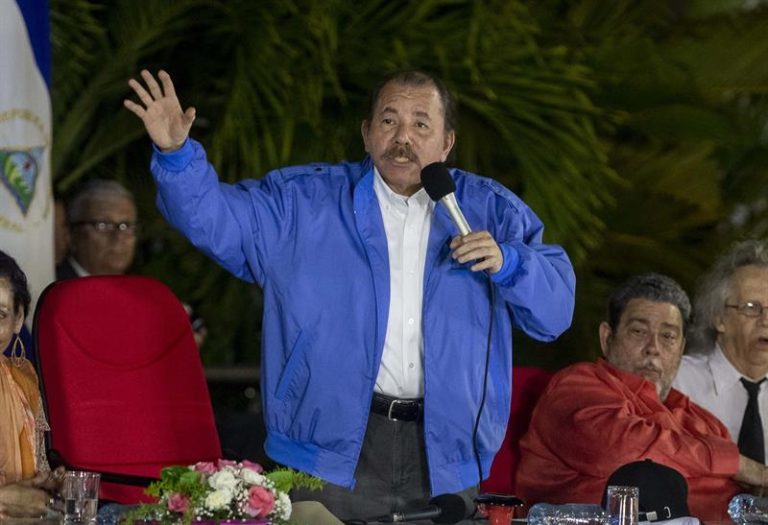7 de diciembre 2018

The Return of the Military

PUBLICIDAD 1M
PUBLICIDAD 4D
PUBLICIDAD 5D
Ortega’s “antiimperialist” regime has deepened Nicaragua’s economic dependence on the United States.

Ortega’s “antiimperialist” regime has deepened Nicaragua’s economic dependence on the United States.
Daniel Ortega has achieved what neither Putin, nor climate change, nor China, nor the immigration problem, nor Maduro nor Syria could do: he inspired nothing more and nothing less than the adoption of a bipartisan consensus between the US Republican and Democratic parties regarding his regime.
What’s more, he managed to become a point of consensus between the US Executive branch, headed by Trump, and the US Congress. It may seem a lie or an exaggeration, but no other topic during Trump’s administration has been resolved with this level of consensus.
In reacting to the decisions adopted by the organs of United States power, Ortega momentarily dusted off the old speeches that he had kept filed away these eleven years and spoke once again of interventionism, of imperialism and other expressions of the like. Then, he fell silent.
He’ll likely speak about it again once he’s assimilated the blow and has designed the course he’ll follow. Meanwhile, it’s important to recall that Nicaragua’s economic dependence with respect to the United States has broadened and deepened during this “antiimperialist” regime of Ortega’s.
Here are some of the statistics:
Foreign Trade: The United States is Nicaragua’s chief trading partner. The bulk of Nicaraguan exports enter the US market free of tariffs as a result of the free trade agreement known as CAFTA. This agreement, it’s worth noting, was promoted and signed by former president Bolanos; it has benefited the economy and Nicaraguan exporters over the past eleven years that Ortega has been in power.
We’ve heard the servants of the regime filling their mouths with talk of the increase in exports. All well and good, but it’s important to underline that 40% of our foreign sales in 2017 were destined for the United States. This year, the rhythm of trade will presumably lead to a percentage greater than 40%.
What are we exporting? A little of everything: coffee, bananas, sugar, meat, peanuts, lobster, cheese, tobacco, fish, gold, among other things. In 2017, these exports to the United States were worth over a billion dollars, representing foreign exchange, production, employment and earnings.
Free trade zones: Some 120,000 Nicaraguan workers, principally women, support their families by plugging away in the free trade zones. The main destination of the merchandise produced in these free trade zones is the US market. The value of the production from the free trade zones that was destined for the United States was almost 2 billion dollars. In other words, nearly all of the jobs in the free trade zones depend on the sales of textiles, harnesses, tobacco, etc., all to the United States.
How much was exported to Cuba in 2017? One million dollars’ worth: yes, you heard right. More than three billion dollars’ worth of merchandise to the United States, between exports and goods from the free trade zones, and to Cuba one million. As far as Venezuela is concerned, in 2017 a little over 100 million dollars’ worth of goods was exported.
Tourism: During 2017, Nicaragua received 367,000 tourists from the United States. These tourists spent almost $90 a day, on average, according to statistics from the Institute of Tourism. How many cottage industries and small and medium businesses have depended on this US tourism?
Foreign investment: Official reports reveal that a significant proportion of these investments come from US business figures.
External cooperation: According to the report of the Central Bank for 2017, the Inter-American Development Bank, IDB, disbursed 328 million dollars, the World Bank 136 million. The United States is one of the principal contributors to these institutions. In addition, bilateral aid from the United States to Nicaragua totaled US $34 million, all directed towards the private sector.
What was the sum of cooperation from Venezuela? US $30 million. So – $34 million from the United States and $30 million from Venezuela. If you don’t believe me, check page 5 of the report I mentioned.
Family remittances: Official data indicates that in 2017, $770 million dollars was sent from the United States. In 2018, by year’s end, that will represent approximately 60% of the total remittances.
In Summary: More than a billion dollars in exports; US $770 million dollars in family remittances; US $2 billion in free trade zone exports; US $464 million in credits from the IDB and the World Bank; 367,000 tourists; US $34 million in bilateral cooperation. All of these figures come from the official data. The true relevance of these statistics can be visualized when we consider that Nicaragua’s entire GNP is approximately US $13 billion dollars.
Further, there’s a human dimension that it’s very important to highlight. Hundreds of thousands of Nicaraguans of different political affiliation and social conditions have found shelter in that country, where they’ve received opportunities to better their lives, to study, to work and to grow personally or professionally. Naturally, everything there has a price, and all of these Nicaraguans have had to work hard to reach their goals. Obviously, not everyone has had the same luck.
In conclusion, when we listen to the speeches against imperialism of the regime’s leadership, we should keep in mind that during the past eleven years they never mentioned imperialism while they were talking about exports, tourism, family remittances, investments, the free trade zones or the credits from multilateral financial institutions, much less when referring to the foreign aid that the army has received.
Take a look and see for yourself. This has nothing to do with sympathy or antipathy towards the United States: these are statistics, representing realities that are important to be aware of
Archivado como:
PUBLICIDAD 3M
Economista y abogado nicaragüense. Aficionado a la historia. Bloguero y conductor de la plataforma de comunicación #VamosAlPunto
PUBLICIDAD 3D